Edie Melson's Blog, page 251
January 8, 2019
Quotations—How Writers Find the Original Source
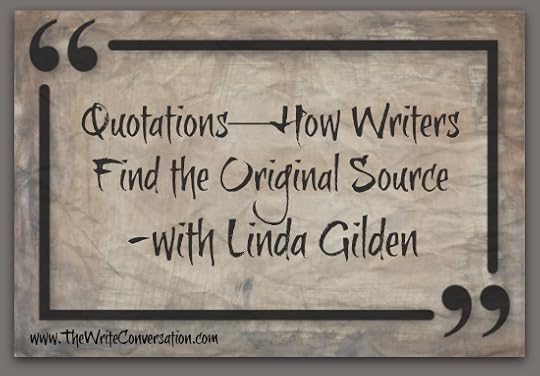
by Linda Gilden @LindaGilden
Often when editing a book for someone I come across a quote that is either improperly sourced or not sourced at all. When I ask the author about it, I have heard many answers. But the most appalling is, “Well, it was on the internet so I thought it was okay to use it.”
Yes, you can use it but not without proper credit and, sometimes, permission.Using quotes from other people or from books lends credibility to your writing and supports the information you are using. Quotations give you a way another expert to reinforce the information you are trying to communicate.
Do your best to track a quote back to the original source. Don’t stop at the first place you see it; that may not be the original source. Some websites or blogs list a source because that is the location they found a quote. However, they may have failed to trace it back to the original source.
How can you do that?
First, consider the source that is listed with the quote. Is it attributed to someone who has been gone for decades or maybe even centuries but the source has been listed as a contemporary website, blog, or book? If that is the case, you’ll need to do some research.
For instance, Alexander Hamilton is quoted on several of the often-used quote websites as having said, “When the sword is once drawn, the passions of men observe no bounds of moderation.” An entire Broadway musical has been written about this man. But the quote wasn’t original to the musical either. We know Alexander Hamilton didn’t say that yesterday but we don’t know if it was part of a speech, written in a book, or spoken to his next-door neighbor.
The best place to locate the source of the quote is to paste it into google with quotation marks around it. Carefully study the resources that come up. Many of them will be the well-known sites for quotes. Select one that will take you back to an original source.
We know Alexander Hamilton lived in the late 1700s. So I looked for entries that were historical in nature or contained papers with Hamilton’s writing in them. Finally found that this quote was part of Hamilton’s efforts in Federalist paper #16 to address the inadequacy of the Articles of the Confederation and argue for a federal government. It was dated 4 December 1787.
When giving attribution to the quote you are using, you do not have to put all that information with the quote. It would be fine to say in your article or book, “In 1787 Alexander Hamilton said, ‘When the sword is once drawn, the passions of men observe no bounds of moderation.’” However, when you turn it in to the editor, he or she will appreciate a separate source sheet that tells him or her just where to find the original source.
Beth Patch, Spiritual Life Producer at CBN.com, says, “Since we are online, I prefer not to use footnotes or endnotes. I usually cite the resource in the body of the text and hyperlink it where possible. If the source was a book, I would hyperlink to the book.”
When you are writing an article for a specific magazine, ask your editor “How do you prefer quotes to be handled? Do you want sources cited in the body of the manuscript, prefer footnotes, end notes, or just a reference or resource sheet?” This information is sometimes found in the writer’s guidelines.
“I think it is important when I quote someone, to make sure I use the direct quote in quotation marks and include the author’s name,” says Susan Reichert, Editor-in-Chief, Southern Writers Magazine.“Right after the author's name, I then feel it important to cite the place I got the quote along with the website address.”
Different editors will handle quote citation in different ways but all will want correct, original sources. With the current trend being to use few or no endnotes and footnotes, documentation often is put on a separate sheet and sent with your manuscript. That information will be filed by the editor and only used if someone inquires about the original source.
Writers love to use quotes. One word of caution, if you find the perfect quote to support your writing but you have never heard of the person who said the words, be sure to look him or her up. As inspirational writers, we need to make sure we quote people who are believers. Otherwise, readers may wonder if our beliefs align with the source of the quote who may believe very differently and have values unlike our own.
Quoting from the internet is no different than quoting from anywhere else. Don’t make the mistake my editing client did and think that just because words are on the world wide web, they are not free and clear world wide words for anyone to use.
TWEETABLESQuotations—How Writers Find the Original Source - @LindaGilden on @EdieMelson (Click to Tweet)
Every writer needs to know how to find the original source for the quotations we use - @LindaGilden on @EdieMelson (Click to Tweet)
 Linda Gilden is an award-winning writer, speaker, editor, certified writing and speaking coach, and personality consultant. Her passion is helping others discover the joy of communicating with excellence. In the midst of all the busyness, Linda’s favorite activity is floating in a pool with a good book surrounded by splashing grandchildren—a great source of writing material! www.lindagilden.com
Linda Gilden is an award-winning writer, speaker, editor, certified writing and speaking coach, and personality consultant. Her passion is helping others discover the joy of communicating with excellence. In the midst of all the busyness, Linda’s favorite activity is floating in a pool with a good book surrounded by splashing grandchildren—a great source of writing material! www.lindagilden.com
Published on January 08, 2019 22:00
January 7, 2019
Writing So They Can’t Put it Down
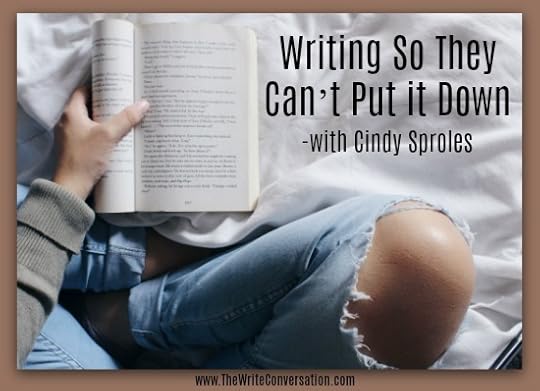
by Cindy Sproles @CindyDevoted
It was a fast read.”
In the beginning, hearing the words, “It’s a fast read,” almost made me feel a little sick. Was it a primer? Too elementary? But no. It was quiet the opposite. Being a fast read was one of the highest compliments I could have been paid. To have a reader pick up my book and continue to be so enthralled they couldn’t put it down, was a pat on the back.Learning to write those page turners takes time and thought. It requires a fine balance between telling a solid story and making smooth, yet nagging transitions into the next chapter. I love to add a cliffhanger at the end of every chapter. These last paragraphs or sentences at the end of each chapter are what tease the reader into flipping the page. They can’t bear not knowing what will happen next, so it’s important to understand a few things about these ending phrases.
The question is, exactly what is a cliffhanger and how do you insert them into your chapter without leaving a cheesy taste for your reader? First off, a cliffhanger is not always something earth shattering. In fact, the most effective cliffhangers come when the author leaves the reader holding on to a character’s thought or motivation. It’s the “what if” factor or ratcheting up the tension – something unexpected happens. . . or fails to happen, a new thought or change of thought process.
The writer has to look ahead. Consider foreshadowing (hints of what is to come) or leaving your reader in the middle of a thought. For example, your character makes a decision:
Owen knew the answer. He held the key in his hand all along . . . talk to Ericka. Just talk to Ericka.
Leaving a character struggling to make a decision forces the reader to push forward. What did Owen say? Why was he afraid to talk to Ericka? What was so important? Raising these questions drives the reader ahead. If you haven’t noticed, readers are a curious bunch. They love wondering. So, keep them wondering.
Or, perhaps it’s a moment when the character realizes something important.
Example: I flipped open the worn pages of his Bible and pressed my finger against the words. I had my proof. My vindication right in the lines of the Good Book. An eye for an eye. “How’s this Daddy? An eye for an eye . . .”
There are different schools of thought on the subject of cliffhangers, but for me . . . I love them and I practice them at the end of every chapter. Why? It’s a challenge for me as a writer and a ring-in-the-nose for my reader that allows me to clip on the rope and continue to pull them deeper into the story.
Some authors insist cliffhangers are unnecessary if you write a compelling story, but a compelling story should be filled with exhilaration and “take-your-breath realizations” that drive your reader into a deeper investment in the characters. Carefully placed cliffhangers are the icing on an already compelling story.
A good cliffhanger acts as a lure. It proves to be just as valuable as the opening hook in paragraph one of the first chapter. Sometimes the perfect cliffhanger is a simple statement from a character that reinforces the chapter’s tension.
For example: There was nothing left to say. When the gavel hit the desk, guilty rang through the courtroom.
Equally as important as utilizing a cliffhanger is knowing not to overuse them. When your reader is deeply invested in your story, their heart races, they wiggle in their chair with the intensity of the scene so there are times, very important times, that you give the reader the opportunity for a breath. Let them relax for a second. In other words, you don’t over write them throughout your chapter. Instead, you carefully craft it in the last paragraph or line so it leads smoothly into the next chapter.
It’s important readers also experience success with the character. If you overdo it, your reader may feel the story is too intense or worse – hopeless. Ask yourself the question, “Can my reader take a breath?” If not – give them one. As much as we love drama and action, we need to experience some hope and peace. These strategically placed sentences, enrich your readers experience.
In a conference class under the late Ron Benrey, he shared his thoughts on the importance of a good cliffhanger. “A good story. . .a really good story, piques every sense and emotion of the reader, not once, but over and over. Carefully placed cliffhangers bring the story to life. It’s like the character reaches from the pages of the book, takes the reader by the wrist and yanks them into a fictional bubble which refuses to let them escape. This, and this alone, gives the reader an experience they long for.”
As you study your chapters, carefully assess how you can apply a good solid chapter endings. Decide what type of emotion you need to tweak and then jump on it. Learn to make your readers hunger for the next page and give them the pleasure. When they finish your book and close the cover, they should have received reading experience they deserve. Your best hope as a writer, is an email that asks you for “more.” When that happens – it’s a win-win for you and for the reader.
TWEETABLESWriting so they can't put it down - thoughts from Cindy Sproles, @CindyDevoted, on @EdieMelson (Click to Tweet)
Tips on writing cliffhangers right from Cindy Sproles, @CindyDevoted, on @EdieMelson (Click to Tweet)
 Cindy Sproles is an award-winning author and popular speaker. She is the cofounder of Christian Devotions ministries and managing editor of Straight Street Books and SonRise Devotionals, imprints of Lighthouse Publishing of the Carolinas. Cindy is the executive editor of www.christiandevotions.us. She teaches at writers conferences nationwide and directs The Asheville Christian Writers Conference - Writers Boot Camp.
Cindy Sproles is an award-winning author and popular speaker. She is the cofounder of Christian Devotions ministries and managing editor of Straight Street Books and SonRise Devotionals, imprints of Lighthouse Publishing of the Carolinas. Cindy is the executive editor of www.christiandevotions.us. She teaches at writers conferences nationwide and directs The Asheville Christian Writers Conference - Writers Boot Camp. She is the author of two devotionals, He Said, She Said - Learning to Live a Life of Passion and New Sheets - Thirty Days to Refine You into the Woman You Can Be. Cindy's debut novel, Mercy's Rain, is available at major retailers. Visit Cindy at www.cindysproles.com and book her for your next conference or ladies retreat. Also connect with her on Facebook and Twitter.
Published on January 07, 2019 22:00
January 6, 2019
A New Year & A New Column for Writers
Edie here. I cannot tell you how excited I am to have Ralene Burke joining us here on The Write Conversation. She's an amazing spec fiction author and has a heart to help other writers. I know you will be as blessed as I am to have her here. Be sure to give her a warm TWC welcome!

A New Year & A New Column for Writers
by Ralene Burke @RaleneB
Happy New Year, writers! My name is Ralene Burke, and I am the Marketing Director for Realm Makers (more on that in a minute). I am so thrilled that Edie invited us to have a monthly column on The Write Conversation. I have so many exciting things to share with you in the coming months—writing tips, special guests, and more—all having to do with some aspect of the growing genre of speculative fiction.
What IS Speculative Fiction?
Wait, what? You’re not sure what speculative fiction is? Well, I’ve got you covered. Speculative fiction is an umbrella genre that encompasses all stories that involve speculating beyond what we currently know: fantasy, sci-fi, supernatural/paranormal, horror, steampunk, and of course any mash-up that includes those genres.
Speculative fiction is not just Star Warsand Lord of the Rings. Some authors, like Frank Peretti, are celebrated in the Christian market, while others find crossover success, like Ted Dekker, Thomas Locke, or Tosca Lee, all who have been keynote speakers at Realm Makers.
We’ve seen a resurgence in recent years of readers looking for cleaner speculative fiction. I’m not talking squeaky clean—but stories that leave out gratuitous sex scenes and graphic violence. We’re happy to report there’s also a growing number of authors rising to meet this need!
What IS Realm Makers?
Realm Makers is the premiere organization bridging the gap between speculative fiction writers of faith, whether they write for the Christian market or the general market, and the readers looking for engaging books from a Christian worldview. We are mid-way through our sixth year, and we’re still growing and expanding with so many opportunities for writers and readers.
What do we offer?
For writers:Our Writers Conference, held July 18-20 in St. Louis this year, is our annual opportunity to come together to learn, network, and grow our family!Our Membership Program has plenty of benefits like the special Slack community, webinars by publishing professionals, a valuable newsletter, discounts on conference registration, and marketing opportunities.The Realm Awards are our annual awards program where we celebrate the best in speculative fiction by writers of faith.Realm Makers Consortium is a Facebook community open to all speculative fiction writers whether they are members of Realm Makers or not.
For readers:The Mobile Bookstore, where we take select books to the readers by attending book festivals, homeschool conferences, and more!The Online Bookstore is the place to see our inventory if you can’t make it to one of the events.Monthly Newsletter that highlights new releases, author interviews, etc.
I look forward to getting to know y’all in the coming months, and I hope you will ask me any questions you have or just let me know what you love about speculative fiction (whether you write it or read it)! I’ll catch up with you all next month.
TWEETABLESA New Year & A New Column for Writers from @RaleneB on @EdieMelson (Click to Tweet)
Information and resources for #specfiction writers via @RaleneB on @EdieMelson (Click to Tweet)
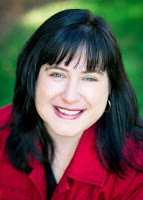 Whether she’s wielding a fantasy writer’s pen, a social media wand, or a freelance editor’s sword, Ralene Burke always has her head in some dreamer’s world. And her goal is to help everyone #SHINE Beyond their circumstances! Her novels, Bellanok and Armor of Aletheia, are available on Amazon. More fantasy novels coming soon!
Whether she’s wielding a fantasy writer’s pen, a social media wand, or a freelance editor’s sword, Ralene Burke always has her head in some dreamer’s world. And her goal is to help everyone #SHINE Beyond their circumstances! Her novels, Bellanok and Armor of Aletheia, are available on Amazon. More fantasy novels coming soon!
When her head’s not in the publishing world, she is wife to a veteran and homeschooling mama to their three kids. Her Pinterest board would have you believe she is a master chef, excellent seamstress, and all-around crafty diva. If she only had the time . . . You can also find her on Facebook, Instagram, Twitter, or at her website.

A New Year & A New Column for Writers
by Ralene Burke @RaleneB
Happy New Year, writers! My name is Ralene Burke, and I am the Marketing Director for Realm Makers (more on that in a minute). I am so thrilled that Edie invited us to have a monthly column on The Write Conversation. I have so many exciting things to share with you in the coming months—writing tips, special guests, and more—all having to do with some aspect of the growing genre of speculative fiction.
What IS Speculative Fiction?
Wait, what? You’re not sure what speculative fiction is? Well, I’ve got you covered. Speculative fiction is an umbrella genre that encompasses all stories that involve speculating beyond what we currently know: fantasy, sci-fi, supernatural/paranormal, horror, steampunk, and of course any mash-up that includes those genres.
Speculative fiction is not just Star Warsand Lord of the Rings. Some authors, like Frank Peretti, are celebrated in the Christian market, while others find crossover success, like Ted Dekker, Thomas Locke, or Tosca Lee, all who have been keynote speakers at Realm Makers.
We’ve seen a resurgence in recent years of readers looking for cleaner speculative fiction. I’m not talking squeaky clean—but stories that leave out gratuitous sex scenes and graphic violence. We’re happy to report there’s also a growing number of authors rising to meet this need!
What IS Realm Makers?
Realm Makers is the premiere organization bridging the gap between speculative fiction writers of faith, whether they write for the Christian market or the general market, and the readers looking for engaging books from a Christian worldview. We are mid-way through our sixth year, and we’re still growing and expanding with so many opportunities for writers and readers.
What do we offer?
For writers:Our Writers Conference, held July 18-20 in St. Louis this year, is our annual opportunity to come together to learn, network, and grow our family!Our Membership Program has plenty of benefits like the special Slack community, webinars by publishing professionals, a valuable newsletter, discounts on conference registration, and marketing opportunities.The Realm Awards are our annual awards program where we celebrate the best in speculative fiction by writers of faith.Realm Makers Consortium is a Facebook community open to all speculative fiction writers whether they are members of Realm Makers or not.
For readers:The Mobile Bookstore, where we take select books to the readers by attending book festivals, homeschool conferences, and more!The Online Bookstore is the place to see our inventory if you can’t make it to one of the events.Monthly Newsletter that highlights new releases, author interviews, etc.
I look forward to getting to know y’all in the coming months, and I hope you will ask me any questions you have or just let me know what you love about speculative fiction (whether you write it or read it)! I’ll catch up with you all next month.
TWEETABLESA New Year & A New Column for Writers from @RaleneB on @EdieMelson (Click to Tweet)
Information and resources for #specfiction writers via @RaleneB on @EdieMelson (Click to Tweet)
 Whether she’s wielding a fantasy writer’s pen, a social media wand, or a freelance editor’s sword, Ralene Burke always has her head in some dreamer’s world. And her goal is to help everyone #SHINE Beyond their circumstances! Her novels, Bellanok and Armor of Aletheia, are available on Amazon. More fantasy novels coming soon!
Whether she’s wielding a fantasy writer’s pen, a social media wand, or a freelance editor’s sword, Ralene Burke always has her head in some dreamer’s world. And her goal is to help everyone #SHINE Beyond their circumstances! Her novels, Bellanok and Armor of Aletheia, are available on Amazon. More fantasy novels coming soon!When her head’s not in the publishing world, she is wife to a veteran and homeschooling mama to their three kids. Her Pinterest board would have you believe she is a master chef, excellent seamstress, and all-around crafty diva. If she only had the time . . . You can also find her on Facebook, Instagram, Twitter, or at her website.
Published on January 06, 2019 22:00
January 5, 2019
A Locked Room of Promises
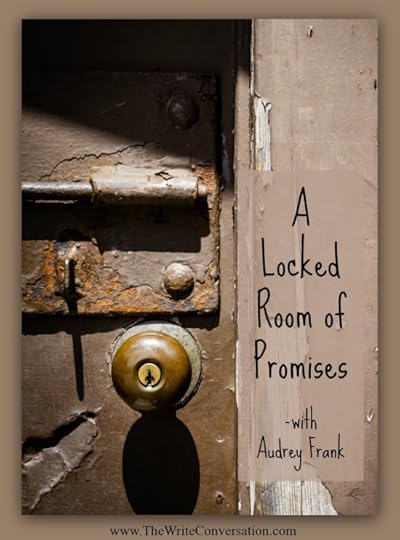
by Audrey Frank @AudreyCFrank
The Lord has made a promise…He promises it as the one who fixed the sun to give light by day and the moon and stars to give light by night. He promises it as the one who stirs up the seas so that its waves roll. He promises it as the one who is known as the Lord who rules over all. Jeremiah 31:35, NET (The Introduction to the Book of Consolation)The first time I laid eyes on the room, the walls were covered in ugly brown carpet, and I was covered in dust and sweat. This was the room I was to somehow transform for my small son and the baby on its way. Tears streaked my dirty face as I sat heavily on the windowsill overlooking the open courtyard, exhausted and too weak for the task of ripping carpet fixed with hundreds of nails to the plaster.
We had lived in the ancient North African city, surrounded by towering, ochre-colored walls, for over a year. Longing for a house with a garden so our son could play and I could grow flowers, we had searched and found this one. The house nestled in a small valley like a cup in a saucer, its rooms forlorn and neglected for too long. It would take work to make it livable, but the rare garden and spacious courtyard was too good to pass up.
For weeks we trekked across the city from our old house to the new, carrying out debris, sweeping, and cleaning. One hot afternoon I arrived to find my husband and a friend laughing merrily as they removed nails, one-by-one from the boys’ room. Those dear men worked tirelessly to transform the unsightly walls into a smooth, paintable surface.
When they were done, I set to work painting the walls a comforting light blue. With brushes borrowed from my three-year-old’s paint jar, I stenciled the promises of God the entire stretch of the long room’s walls, all 50 feet of them.
I searched the Bible for truths, the truest things about my children.
Apple of God’s Eye. Beloved. Accepted. Held. Known. Loved.
Round the room they went, reminding and my children that the truest things about them are what God says about them. When we left that house years later to return to the United States I lingered long in that room of sun-dappled promises. Leaving them behind felt like loss. But I carried God’s promises with me in my heart, and I believed they were true no matter where we dwelt. In the seasons since, we have experienced change, adjustment, growth, and suffering. Pain has come like an unwelcome intruder dressed in disappointment, illness, and death. We have had ample opportunity to ask ourselves, do the promises of God still stand? Last week my husband and son revisited our old house. It has stood empty for ten years now. An impulse rose in me, urgent, pressing.
“Please take pictures of the promise room for me. I need to see that it is still there. That the words are still there, waiting,” I begged my husband.
He didn’t criticize me, and in the way those who have lived life across worlds and cultures understand in each other, he understood my need to see that room once more. They discovered our pet turtle was still there, grown much bigger. The green and yellow swing set brought in from Europe still stood in the garden. But the room of promises was locked tight, the door strong and solid, immovable. They could not enter it. My disappointment was palpable, and I asked God why it mattered so much to me. My promises are true though the door be locked and you cannot see them. God gives us His promises, and He keeps them. We believe them, and we write them on the walls of our lives. We remind ourselves of them, depend on them, repeat them to others. We carry them with us wherever we go. And then we suffer. We go through a season when the promises seem locked away. We can’t see them and our hearts grope around blindly, battling despair. We are not the first to grope blindly for the promises of God we know are there just beyond our reach. In the Old Testament book of Jeremiah, there are three key chapters called the Book of Consolation. In these passages, the prophet comforts God’s people while they were captive in Babylon, speaking of the restoration and the new covenant to come. He reminds them of God’s promises, which surely seemed locked in a room with a door they could not budge during those seventy long years. The Lord has made a promise…He promises it as the one who fixed the sun to give light by day and the moon and stars to give light by night. He promises it as the one who stirs up the seas so that its waves roll. He promises it as the one who is known as the Lord who rules over all. Jeremiah 31:35, NET (The Introduction to the Book of Consolation) The One who promised them restoration and a new covenant through the coming Messiah was no mere mortal with shifting opinions and allegiances. He was the Lord who rules over all, the one who fixed the sun and moon into the heavens and created the seas.
No promise breaker, that One.
Do the promises of God seem locked away from your view today, inaccessible? Take heart, for the One who promises is the One who caused the sun to rise this morning. He is no breaker of promises. They remain, though the door be locked.
Lord, help me trust You today to keep your promises to me. Amen.
TWEETABLE
A locked room of promises - insight from @AudreyCFrank on @EdieMelson (Click to Tweet)
 Audrey Frank is an author, speaker, and storyteller. The stories she shares are brave and true. They give voice to those whose words are silenced by shame, the hard things in life that don’t make sense, and the losses that leave us wondering if we will survive. Audrey and her family have spent over twenty years living and working among different cultures and world views, and she has found that God’s story of redemption spans every geography (geographical location) and culture. He is the God of
Instead
, giving honor instead of shame, gladness instead of mourning, hope instead of despair. Although she has three different degrees in communication and intercultural studies, Audrey’s greatest credential is that she is known and loved by the One who made her.
Audrey Frank is an author, speaker, and storyteller. The stories she shares are brave and true. They give voice to those whose words are silenced by shame, the hard things in life that don’t make sense, and the losses that leave us wondering if we will survive. Audrey and her family have spent over twenty years living and working among different cultures and world views, and she has found that God’s story of redemption spans every geography (geographical location) and culture. He is the God of
Instead
, giving honor instead of shame, gladness instead of mourning, hope instead of despair. Although she has three different degrees in communication and intercultural studies, Audrey’s greatest credential is that she is known and loved by the One who made her.Her upcoming book, From Shame to Honor, is an outpouring of Audrey’s heart to introduce others to the God of Instead. Shame is not unique to the developing world, the plight of the women behind veils, young girls trafficked across borders; shame is lurking in hearts everywhere. Through powerful stories from women around the world, From Shame to Honor illuminates the power of the Gospel to remove shame, giving honor instead. Look for it through Harvest House Publishers in the fall of 2018.
Published on January 05, 2019 22:00
January 4, 2019
Writing To a Non-Christian World
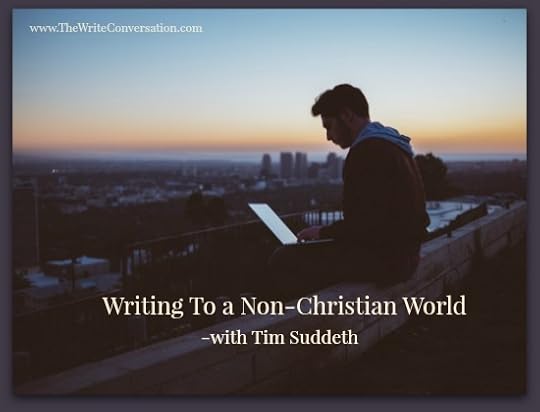
by Tim Suddeth @TimSuddeth
But in your hearts revere Christ as Lord. Always be prepared to give an answer to everyone who asks you to give the reason for the hope that you have. But do this with gentleness and respect I Peter 3:15 (NIV)
A few years ago, I was sitting at the lunch table at the Blue Ridge Mountains Christian Writers Conference. This is one of my favorite places because I usually get there early and I never know who will join me. But I can expect that they love writing.
A retired missionary doctor joined our table, his face as long as the walk back to our rooms. I can only guess that his memoir had just met with some less than desired criticism.
He lamented that we were no longer interested in apologetics.
I wanted to ask him when he had last walked through a Lifeway store.
But on the way up the hill, the finger I’d pointed turned to me. Who were the current apologists doing battle for the faith? My answers of C. S. Lewis (Mere Christianity), Josh McDowell (Evidence That Demands a Verdict), and Lee Strobel (The Case for Christianity), all though classics, left a lot to be desired when looking for something contemporary.
Imagine my joy when my wife brought home Forensic Faith by J. Warner Wallace, published in 2017.
Here, I feel like I need to take a step back.
Apologetics is being able to defend the basics of your faith.
I can already see the arms crossing, stern countenances, and head shaking. The Bible said it, my mama told me, or our church believes . . .
Ever tried using that on your friend or your child when they come to you with a question? You’re forced to get silent in a hurry.
J. Warner Wallace was an atheist and a homicide detective. He used his skills in making cases for trials to investigate the truth of the gospel. Then, like has happened many times in the past and the present, God showed up.
Wallace, in his book, challenges us to take our faith into the world. Often, we hear something on the news or TV, and we want to shut the doors and close the windows. It scares us and we feel like we are all alone. And if we go out, what we believe will be showed to be false.First, like Elijah in I Kings 19, we are not alone. God has a lot of other followers and activity going on, they just may not show up on TV. Although, it’s amazing how much his works are on TV when you look for them.Second, when you believe the truth, you don’t have to worry about someone disproving it. Just make sure it is God’s truth you believe, not a good saying.
Wallace tells about an atheist on YouTube who makes videos to teach others how to talk Christians out of their faiths. He instructs them to get us to not consider the evidence, but the way we evaluate truth.
Because we can get tripped up when we only know what our parents or our preachers say. But our main weapon is, the truth is the truth.
We need to realize that Christ isn’t just real and important to our lives in church on Sundays, but He’s just as present at school, work, or in our homes throughout the week.
Forensic Faith shows that we are called to take our faith into the world. (Sound familiar?) To do that effectively, we have to know what our listeners/readers believe and what is the truth (not just what we think).
Well, Tim. All this is sweet, but what does it have to do with writing?
I just completed my latest first draft. After taking a breath, I want to go back through and make sure my message, my theme gets across. It’s nice to tell a story, but it seems wasteful not to also give a message that is helpful to my readers. (I like to think my audience will be plural).
To me, the most important message I can give in our world today is one of hope. We hear so much negativity, see so much anger, and face so many hurdles or trials: that we need to hear that there is hope.
And I know the only source of true hope is in Jesus.
But a lot of people are tired of hearing this message from people who don’t seem to live it themselves. Or they’ve heard the message from people who use it for their own agendas. I read where a good man who is trying to live his faith was described as homophobic and backward thinking.
How can I share the message in a way that is honest and the reader will be open to hearing without being stuck on preconceived biases? How can I use my characters to show that even when things aren’t going well (I write mystery/suspense) you don’t have to go through it alone or for no reason?
Forensic Faith provides helpful information and advice to help you make a bridge to get your message to your readers.
I like how the book closes. Wallace talks about the importance of sheepdogs. He says that in a police officer’s mind, “the world is filled with potential victims (sheep) and perilous victimizers (wolves). Police officers stand in the gap; we’re the thin blue line separating the sheep from the wolves. We are sheepdogs.”
Our world and our churches, and our families, need people who can defend Christ’s teachings without becoming offensive. Join with me in trying harder to become one in this new year.
I would love to read your comments below. And, can you recommend any other current writers who write apologetics?
TWEETABLE
Writing to a Non-Christian World - @TimSuddeth on @EdieMelson (Click to Tweet)
 Tim Suddeth has been published in Guideposts’ The Joy of Christmas and on www.christiandevotions.us. He’s working on his third manuscript and looks forward to seeing his name on a cover. He is a member of ACFW and Cross n Pens. Tim’s lives in Greenville, SC with his wife, Vickie, and his happy 19-year-old autistic son, Madison. Visit Tim at www.TiminGreenville.com and on Facebook and Twitter. He can be also reached at timingreenville@gmail.com.
Tim Suddeth has been published in Guideposts’ The Joy of Christmas and on www.christiandevotions.us. He’s working on his third manuscript and looks forward to seeing his name on a cover. He is a member of ACFW and Cross n Pens. Tim’s lives in Greenville, SC with his wife, Vickie, and his happy 19-year-old autistic son, Madison. Visit Tim at www.TiminGreenville.com and on Facebook and Twitter. He can be also reached at timingreenville@gmail.com.
Published on January 04, 2019 22:00
January 2, 2019
Evaluate Your 2018 Writing Year - What Worked & What Didn’t
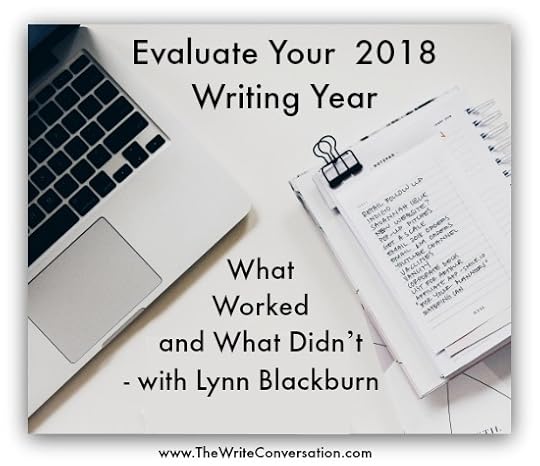
by Lynn Blackburn @LynnHBlackburn
Have you made resolutions for the new year? Did you choose one word? Do you think all of it is a waste of time because it won’t really make any difference by Valentine’s Day?
I’ve been all of those people over the years. I’ve made resolutions, chosen words, and sometimes refused to do any of it. I’m not knocking any of those options (I still like to choose one word), but over the past few years, there’s one simple process that I’ve found to be truly beneficial for me. You can do this exercise at the conclusion of any major or minor event—a calendar year, school year, vacation, writing conference, or birthday party—and it will be pay off down the road. The idea isn’t original to me. I think I picked up the terminology from one of my favorite blogs (Modern Mrs. Darcy) and ran with it.
I make two lists: What Worked and What Didn’t Work
You can call your lists whatever you want (I’m also fond of The Good, The Bad, The Ugly) but I prefer this phrasing because it helps me remember not to pass judgment on myself for the things that didn’t work. Sure, I know they didn’t work now, but six months ago when they were all new and exciting there was no way for me to know they would end in disaster! There are things you can only learn by doing, and while hindsight may be 20/20, it’s important to give yourself grace. So instead of calling my lists “Smart Choices” and “Dumb Ideas” I prefer to acknowledge that some things worked really well, and some things? Not so much.
What I like about this process—especially for writers—is that the writing life is a constant journey of discovery. You learn about conferences, and craft, and contests. Then you publish and you learn about deadlines and edits and publishing schedules. You’re always cycling through things that are comfortable and familiar while adding things that are new and challenging. There’s always room for improvement and there will always be things you wish you’d done differently. This process helps me see the areas where I’ve finally landed on a method I like and the areas where I still need to keep looking for the best approach.
For example, in 2018 I learned I love teaching at conferences and it’s something I want to continue doing in the future. I also learned that it’s a bad idea for me to travel multiple times in six weeks. Very bad! I could sit here and feel guilty about it, but I’m not. I learned my lesson. When I have an opportunity to teach at conferences in 2019, I’ll be weighing that against my travel schedule and I’ll make my decisions based on what I now know is best for me and my family.
My 2018 lists also have a lot of entries specific to launching books. I released two books this year and I learned a lot about what works and what doesn’t work for me. By taking the time to make these lists now while it’s still fresh in my mind, when I come to it again in 2019, I’ll be able to look back at my list and see what things I want to duplicate and what things I want to avoid.
Making these lists may help you discover things you hadn’t thought of yet. Maybe you thought summer would be a great writing season for you but you only managed 5,000 words. Maybe you attended a writing conference that was so amazing you know you need to return this year. Maybe you realize you’ve spent a lot of time building your platform (yay!) but in the process you’ve fallen behind on your actual writing (boo!) and something needs to change. Maybe you tried a new marketing strategy and it met with lackluster results. Maybe you agreed to a deadline that nearly killed you or maybe you’ve learned that you write best on Saturday mornings from 6-9 a.m. (bless your heart).
Regardless of how you feel about planning and resolutions, I encourage you to spend a few minutes reflecting on the year that has passed so you can make wise decisions in the year ahead.
It really does work!
Grace and peace,

TWEETABLESEvaluate Your 2018 Writing Year - What Worked & What Didn’t - @LynnHBlackburn on @EdieMelson (Click to Tweet)
Insight on how to evaluate your writing year and move forward into 2019 from @LynnHBlackburn on @EdieMelson (Click to Tweet)
 Lynn H. Blackburn believes in the power of stories, especially those that remind us that true love exists, a gift from the Truest Love. She lives in South Carolina with her true love, Brian, and their three children. Her new Dive Team Investigations series kicked off in March of 2018 with Beneath the Surface. The second book in the series, In Too Deep, releases in November of 2018 with the third book to follow in 2019. She is also the author of Hidden Legacy and Covert Justice which won the 2016 Selah Award for Mystery and Suspense and the 2016 Carol Award for Short Novel. You can follow her real life happily ever after at WWW.LYNNHBLACKBURN.COM and on FACEBOOK, TWITTER, PINTEREST, and INSTAGRAM.
Lynn H. Blackburn believes in the power of stories, especially those that remind us that true love exists, a gift from the Truest Love. She lives in South Carolina with her true love, Brian, and their three children. Her new Dive Team Investigations series kicked off in March of 2018 with Beneath the Surface. The second book in the series, In Too Deep, releases in November of 2018 with the third book to follow in 2019. She is also the author of Hidden Legacy and Covert Justice which won the 2016 Selah Award for Mystery and Suspense and the 2016 Carol Award for Short Novel. You can follow her real life happily ever after at WWW.LYNNHBLACKBURN.COM and on FACEBOOK, TWITTER, PINTEREST, and INSTAGRAM.
Published on January 02, 2019 22:00
January 1, 2019
Subtext for Writers, Part 2 - How It's Done Right
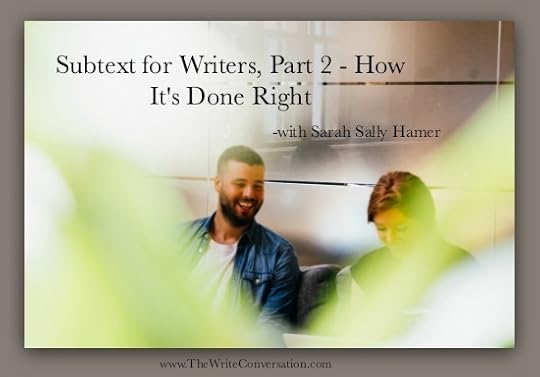
by Sarah Sally Hamer @SarahSallyHamer
Last month, we talked about WHY we use sub-text in our stories. This month, we talk about a couple of ways to do it.
Character Information and BackstoryWhy do you pick the characters you do for your story? We look for 'types' of characters - old, grumpy men, irritating children, aging hippies, warm grandmothers, gruff soldiers - we could names hundreds of character types, any of which might be the perfect one for a particular role in your story.
But what are they really? Are they just “the type” or is there a subtext beneath the reasons they're in the book?
Let's take Scarlett O'Hara. She's the epitome of selfish, spoiled and head-strong at the beginning of the story. But she won't leave Melanie in childbirth, even with the danger to her own life. She slaps her sister for hysterics, but Scarlett “prostitutes” herself - first to Rhett and then to Frank - to pay the taxes on Tara. We may not like Scarlett for going after what she wants but she doesn't sit around the house bemoaning her fate like too many women of that time period probably would have. She got up off her duff and made sure that everyone had enough to eat, even if she had to make them work too.
What's her subtext? We could wonder what she ever saw in Ashley (which is a question that I still haven't answered), we can try to figure out why she couldn't see Rhett as what he was (the perfect match for her) or we could try to understand why she was willing to sacrifice everything for Tara, especially since she could have lived a much easier life in Atlanta. Those are all things that she brings to the table from the very beginning. We as the reader must be able to uncover who she really is (subtext) from the Southern lady (text) she pretends to be.
Think about the dance scene near the beginning of the movie. Scarlett is dressed from head to toe in black, mourning a man she cared nothing about. She wants to dance and, because of social norms, can't without causing a scandal. So, we see her leaning on the table (text) with her feet flying underneath (subtext). And then Rhett comes along and shows her that thumbing her nose at convention is a lot more fun no matter what all the fuddy-duddies think. Subtext!
Can you think of a way to use subtest in your story? What mysterious secret is your protagonist hiding? How does she hide it? And when she finally confesses, what changes does it bring?
Next month, Words and Subtext.
TWEETABLES
Subtext for Writers, Part 2 - How It's Done Right - @SarahSallyHamer on @EdieMelson (Click to Tweet)
Tips for using subtext in your writing - @SarahSallyHamer on @EdieMelson (Click to Tweet)
Seger. Dr. Linda. Writing Subtext: What Lies Beneath. ISBN# 9781932907964
 Sarah (Sally) Hamer is a lover of books, a teacher of writers, and a believer in a good story. Most of all, she is eternally fascinated by people and how they 'tick'. She’s passionate about helping people tell their own stories, whether through fiction or through memoir. Writing in many genres - mystery, science fiction, fantasy, romance, medieval history, non-fiction – she has won awards at both local and national levels, including two Golden Heart finals.
Sarah (Sally) Hamer is a lover of books, a teacher of writers, and a believer in a good story. Most of all, she is eternally fascinated by people and how they 'tick'. She’s passionate about helping people tell their own stories, whether through fiction or through memoir. Writing in many genres - mystery, science fiction, fantasy, romance, medieval history, non-fiction – she has won awards at both local and national levels, including two Golden Heart finals.A teacher of memoir, beginning and advanced creative fiction writing, and screenwriting at Louisiana State University in Shreveport for over twelve years, she also teaches online for Margie Lawson at www.margielawson.com. Sally is a free-lance editor and book coach at Touch Not the Cat Books, with many of her students and clients becoming successful, award-winning authors.
You can find her at www.sallyhamer.blogspot.comor on Twitter @sarahsallyhamer.
I wish to express gratitude to the giants whose shoulders I stand on and who taught me so much about the writing craft. I would list every one, if it were only possible.
Published on January 01, 2019 22:00
December 31, 2018
Have a Very Happy New Years!
Published on December 31, 2018 22:00
December 30, 2018
Does It Really Matter If I'm a Digital Immigrant or a Digital Native?
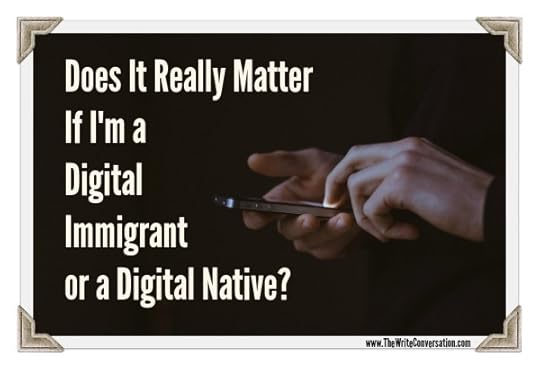 by Edie Melson @EdieMelson
by Edie Melson @EdieMelsonWe live in an interesting time, to say the very least. Changes are happening faster than the most diligent among us can record, much less keep up with.
Our digital world seems to be the catalyst for the majority of those changes. Because I am a part of the the older generation (ouch, that hurts) I hear a lot of derogatory comments about technology and the fact that our generation is not a digital native. We are classified as digital immigrants.Digital Immigrant vs. Digital NativeIt’s a fact that many of us didn’t grow up around the technology we have today—and some of us not around any technology. That truth makes some things tough. But that difficulty is no excuse to quit. I didn’t grow up having to do a lot of things, but as an adult I had to learn.
Growing up, we had telephones connected by a cord in the wall, television sets that had to be changed with a knob on the front, and there was only one kind of mail and it involved paper, an envelope and a stamp. I’ve managed pretty well to learn how to use a remote control, cell phone, and manage email.
The truth is, we learn what we want to learn.
I hear a lot of people lamenting the “good ol’ days” and wishing we could go back.
If we think back, the good old days weren’t all that great. Making phone calls meant encountering busy signals, disconnections, and angry parents who were tired of teenage girls tying up the phone line talking to boyfriends. The television was grainy, it went off the air at midnight, and there were only about a dozen channels. Then there was mail. It certainly was no more reliable than the email I deal with today.
Yes, times were simpler. But I remember my parents and grandparents complaining about how complicated life had gotten.
Every time has its irritations and difficulties.
But I would propose to you that our birth into this place and this time was no accident. God is not surprised by the stresses we encounter or the obstacles we encounter.
...And who knows but that you have come to your royal position for such a time as this? Esther 4:14b (NIV)
Instead, I put forth the idea that He has a purpose for us in this point in history. And furthermore, that our digital struggles are part of that purpose.
Perhaps we need to stop looking at social media from such a small, one-sided, viewpoint. What if sharing information about our books and our message was secondary—a byproduct of what God actually intents. Suppose the whole point of this is to spread His message. Here are some things that God has me thinking about:What if my refusal to learn to connect on social media is actually interfering with the purpose God has for me here and now?What if using the fact that I’m a digital immigrant as a crutch is hindering God’s plan for my life?What if, instead of ignoring or boycotting social media, God’s purpose is to retake it for His glory.These aren’t easy-to-answer questions. But they are questions we should be asking ourselves. God put us here for such a time as this. I for one, have decided that I need to embrace this time and look for places to join Him in His work, no matter how uncomfortable that makes me. How about you?
Don’t forget to join the conversation!Blessings,Edie
TWEETABLE Digital Immigrant or Digital Native—Does it really matter? Thoughts from @EdieMelson (Click to Tweet)
Published on December 30, 2018 22:00
December 29, 2018
Moving Forward by Looking Back - One Word 2019
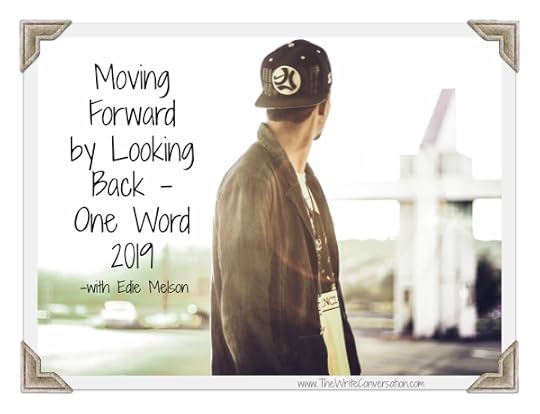 by Edie Melson @EdieMelson
by Edie Melson @EdieMelsonThe writer’s path is a journey of a lifetime—one fraught with discovery and discouragement. We can avoid some of its pitfalls if we define that path early on. Today, I want to share some insights into my writing journey and the markers I look for to help me stay at least in the vicinity of the path.This time of year, between Christmas and New Year's, my thoughts turn backward. I use this time to evaluate the past year and prepare for the next one. I've given up New Year's Resolutions completely and find the freedom from those expectations (and failures) a major relief.
But I have implemented something else instead. My husband and I spend some time looking back at our spiritual markers for the past year. We evaluate them individually, as a couple and as a family. I also look at them in regard to my past year as a writer.
This is particularly helpful, because staying on the writer's path is difficult because each of our paths are so unique and varied. In the past I've had trouble evaluating my progress because I was comparing my journey to someone else's. I’ve come up with some questions to help me process where I’ve been and where I’m headed.
Questions to Get Me StartedWhat were some of my writing successes this past year? (Not necessarily the most lucrative, but the most rewarding) What were some of my writing setbacks this past year? What writing advice stands out in my mind because it seemed to have been aimed directly at me? What brought me the most joy? (Writing related) As I map out these spiritual markers, the path God has had me on becomes quite clear. And, by knowing where I've been, it becomes clearer where to go next.
The other thing I do this time of year is to choose my ONE WORD and SCRIPTURE for the next year. I've been choosing a Bible verse for the upcoming year since 1996, but I just started choosing a single word to go with it since 2012. My close writing friend Beth Vogt started me on it and the practice has proved invaluable.
ONE WORD
This year, the ONE WORD I've chosen is FULL. I have always struggled with filling my schedule too full of stuff and things that sound fun...or important...or necessary—all without asking God. So this year, I'm focusing on what God says is full for me. When I do that, I feel like I'll be more fruitful, more prayerful and more thankful. It will keep me from dealing with days that are stressful or situations that make me fearful. For me, this is a powerful word and I'm looking forward to year of exploring all God has for me.
The verse I feel like God has led me to to go along with this is:
And to know the love of Christ which surpasses knowledge, that you may be filled up to all the fullness of God. Ephesians 3:19 (NASB)
I'd love for you to share your ONE WORD and/or Bible verse for the year, and hear some of your answers to these questions.
Don’t forget to join the conversation!Blessings,
Edie
TWEETABLESMake progress on your #writing journey in 2019 by taking time to look back - @EdieMelson (Click to Tweet)
Evaluating where you've been in your #writing journey is the first step in moving forward - @EdieMelson (Click to Tweet)
Published on December 29, 2018 22:00




